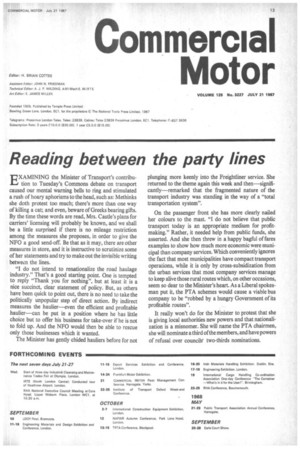Reading between the party lines
Page 15

If you've noticed an error in this article please click here to report it so we can fix it.
EXAMINING the Minister of Transport's contribution to Tuesday's Commons debate on transport caused our mental warning bells to ring and stimulated a rush of hoary aphorisms to the head, such as: Methinks she doth protest too much; there's more than one way of killing a cat; and even, beware of Greeks bearing gifts. By the time these words are read, Mrs. Castle's plans for carriers' licensing will probably be known, and we shall be a little surprised if there is no mileage restriction among the measures she proposes, in order to give the NFO a good send-off. Be that as it may, there are other measures in store, and it is instructive to scrutinize some of her statements and try to make out the invisible writing between the lines.
"I do not intend to renationalize the road haulage industry." That's a good starting point. One is tempted to reply "Thank you for nothing", but at least it is a nice succinct, clear statement of policy. But, as others have been quick to point out, there is no need to take the politically unpopular step of direct action. By indirect measures the haulier—even the efficient and profitable haulier—can be put in a position where he has little choice but to offer his business for take-over if he is not to fold up. And the NFO would then be able to rescue only those businesses which it wanted.
The Minister has gently chided hauliers before for not plunging more keenly into the Freightliner service. She returned to the theme again this week and then—significantly—remarked that the fragmented nature of the transport industry was standing in the way of a "total transportation system".
On the passenger front she has more clearly nailed her colours to the mast. "I do not believe that public transport today is an appropriate medium for profitmaking." Rather, it needed help from public funds, she asserted. And she then threw in a happy bagful of fares examples to show how much more economic were municipal than company services. Which conveniently ignores the fact that most municipalities have compact transport operations, while it is only by cross-subsidization from the urban services that most company services manage to keep alive those rural routes which, on other occasions, seem so dear to the Minister's heart. As a Liberal spokesman put it, the PTA schemes would cause a viable bus company to be "robbed by a hungry Government of its profitable routes".
It really won't do for the Minister to protest that she is giving local authorities new powers and that nationalization is a misnomer. She will name the PTA chairmen, she will nominate a third of the members, and have powers of refusal over councils two-thirds nominations.












































































































